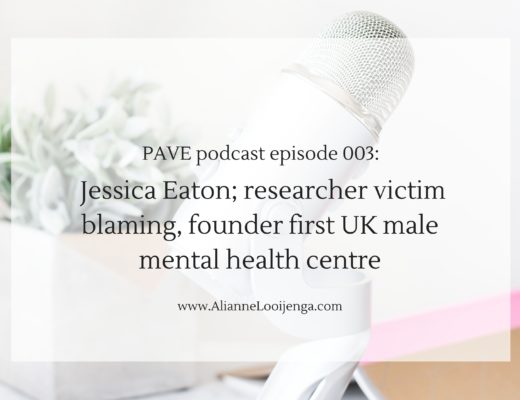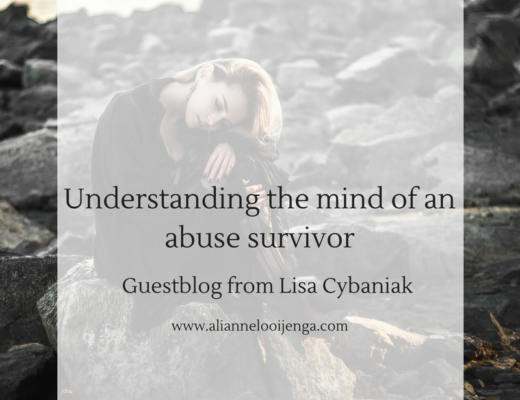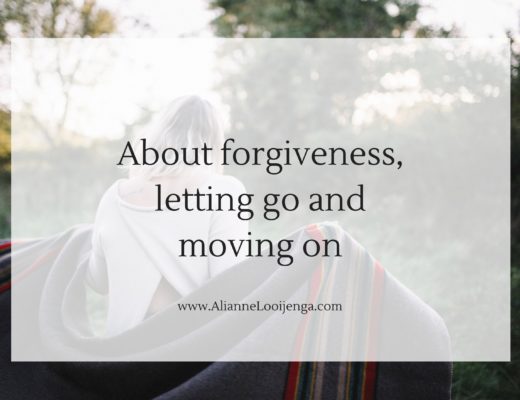(This blog was originally written by me for LifeSurfer in 2015/2016)
Many women who have had a relationship with an abusive partner, battle with trauma.
Sometimes the traumas takes “merely” a few moths but sometimes I encounter women who have been struggling with them for years. It can also happen that the traumas reappear suddenly after being away for many years when, for example, something occurs that consciously or subconsciously reminds you of the time when you developed the trauma.
When I had just moved to my current house, I associated the cars passing by with the time when I had lived in my old house and my ex had been coming back home. With every car passing by (in the evening), I froze and held my breath until I was sure that nobody wanted to enter the house.
For awhile I had the same with angry male voices. I remember a moment when I was going to the grocery store and I heard a man shouting angrily. I froze and suddenly felt small and inferior and had the feeling that I just had done something wrong. This despite the fact that the man was not shouting at me, I had not done anything wrong and even if I had, I would not have to let anyone speak to me in that manner, or shout, to be precise.
How do you get a trauma?
Traumas can also arise even when you have not been physically or psychologically abused. An event can lead to an emotional or psychological trauma when for example:
- It was an unexpected event
- You felt helpless to prevent it or stop it
- It happened again and again
- Someone was intentionally mean
- It happened during your childhood
As an example; one of the deepest fears I developed was through the experiences with child protection services. I know, right? In contrast, I could deal well with the traumas given to me by my ex-partner. I do not want to say that I could rationalize them and surely I have no understanding for what he has done to me and the kids, but I could place those experiences.
What I could not place at all was the behavior of child protection workers who literally put the lives of me and my children at risk, who literally brought us in danger. From them I learned how dangerous it can be when certain people are put in the position of power. And, in that light, also that very few people take responsibility for their own actions.
As you already know, I am passionate about psychology and two experiments that have absolutely fascinated me from the very beginning and simultaneously frightened me are the Milgram experiment and the Stanford Prison experiment. You can find two links to the documentaries about these experiments at the end of this post. Anyway, I am drifting away! Back to the topic of traumas.
What is an emotional or psychological trauma?
Traumas are the result of extremely stressful situations that destroy your feeling of safety and give you the feeling that you have no control whatsoever over your life.
The more scared you are and the more hopelessness you experience, the bigger the chance that you will develop trauma or become traumatized. Each situation in which you feel overwhelmed by what is happening can be traumatic; it does not have to include any factual physical threats.
Traumas can arise through single events such as a brutal robbery or a car accident; or for example through continuous stress such as living with an unpredictable abuser.
You are more prone to traumas if you experience a lot of stress or if you have already developed traumas before, for example through growing up in unsafe environment or when you were sexually abused in your childhood, respectively physically and/or mentally abused.
Possible symptoms of trauma;
- Irritability and mood swings
- Anger
- Fear
- Feeling of disconnection from your environment or your body
- Confusion and difficulties with concentration
- Rapid heartbeat or hyperventilation
- Quick startle response
- Memory loss (or black holes)
- Nightmares
- Tense body, stiff muscles for example in your neck and shoulders
- Difficulty with taking good care of yourself or others
- Insomnia
- Feeling nervous and tense with a lot of inner turmoil, restlessness
These symptoms may persist for a few hours or few days but sometimes they stay longer.
Along the way I noticed that I needed healing from one of the traumas which I had developed through the child protection services. I have no problem whatsoever with speaking in front of 180 people and with answering their most intimate questions about me, but when I spoke to a therapist a few years ago who I asked to help my children dealing with some past experiences, I closed off totally, became scared and barely managed to find my words.
Rationally seen, there is nothing wrong and there is no actual threat from this therapist towards me and my children; on the contrary and I even invited her myself. But because there were so many triggers attached to the contact, my heart started to beat faster, my breath speeded up and I had to talk myself out of the trigger.
That is the moment I know I had work to do. I handle it in the following ways:
First of all;
I go outside and mix with other people. In the example above, where my children were supposed to talk with a new therapist, I went outside, to a local supermarket and then sat down on a bench next to an old man. We talked, and although he was suffering from dementia, he reminded me some of the wisdoms of life..
I know how to calm myself when I am tensed and how to bring myself into a different state of mind by, for example, being more aware of my breath, walk a few blocks, give myself a peptalk, realise what the differences are between fear, threat and triggers and taking overall good care of myself. Through these actions I am less troubled by the triggers, but there still remains a little piece of healing that I must continue to apply.
Tips I have for you:
Mingle with people. Even though you do not feel like it at all. Even when you are afraid to go outside. You can ask them for help, but of course that is not necessary. Blending with other people is very important for your recovery. It is always good to share your feelings. Undertake activities that have nothing, but really absolutely nothing to do with your trauma. Go to a chess club (;-)) or something. Do something that is healthy for you and fun, just don’t do it alone. Find an empowerment circle. Somewhere you could drop by, even if you are not ready yet to talk about it.
Move!
Find a sport that suits you and for which you need all your limbs, so that you will not end up in a downward spiral. Go swimming, as the water has a calming effect on your body and you must stay aware so your head does not go under water; take surfing lessons (that is soooooo fun!), take self-defense classes….. It helps you get out of the state of increased physiological and mental arousal which can lead to anxiety, fatigue and decreased tolerance for pain. Because that ensures that you freeze in a way. Through movement you help your nervous system relax again, which lets the positive hormones circulate through your body and spread their happy wellness vibes.
Tip number 3!
Take good care of yourself and watch for your health. Food has a great impact on how we feel. Of course it does not matter if you eat unhealthy once, but the food we feed our body impacts our energy levels and, thus, also our emotions.
Get enough sleep. If you have difficulty falling asleep, you can for example choose to leave your telephone, computer or iPad outside of your bedroom. The blue screen light keeps your brain alert, and being busy on your mobile phone causes brain activity and disrupts our natural day and night rhythm.
Avoid drugs. Avoid alcohol. (I refuse to explain this:p)
Become aware of the way you breathe. If your breathing is troubled or rushed, try to get it under control.
And last but certainly not least;
Relax. You can do it, for example, by paying attention on your breathing. A guided meditation such as a body scan meditation can help you become more aware of your own body and, because you focus on your physical sensations, you will not worry about your past or your future. That gives you more control over your stress responses. I have attached one example of such meditation, but there are many more of these types of meditations to be found.
Another way that helps me relax is listening to the music. And then, I do not listen to songs that make me sad but I like to listen to something uplifting, for example to “Something Inside So Strong” by Labi Siffre or “Living In the Moment” by Jason Mraz.
It is important to take time to figure out what you really feel. We often want to push our emotions away so that we do not have to feel them, but in order to heal properly it is important to recognize what you feel without letting those emotions be in charge.
Learn to live in the moment. The past is gone and you cannot change anything about it anymore, apart from learning to look at it in a different way. The future is yet to come and you can only influence it to some extent by choices which you are making today… The now is the only thing you really have. It makes no sense to worry about “what ifs” because the chance is big that what you think will not happen. And if you notice that you have thoughts that do not make you stronger, replace them with a strong thought. Jason Mraz sings about it so nicely in “Living In the Moment”: “I can’t walk through life facing backwards” and this is exactly how it is.
And if you are not managing… look for help. Find a therapist or psychologist who feels right for you. Engage her or him on your own, especially if a child is involved in the situation. Take control of your own life and do not remain stuck needlessly in your trauma. You can find your way out by taking control of your thoughts, your feelings and associations/meanings you give to the happenings.
People react differently to traumatic experiences and there is no right or wrong reaction. But by applying some of the tips above – those which suit you – I hope to have inspired you to take steps to free yourself.
https://www.youtube.com/watch?v=bqQiS9GF1JU&feature=youtu.be
https://www.youtube.com/watch?v=1HcMWlnTtFQ&feature=youtu.be




No Comments